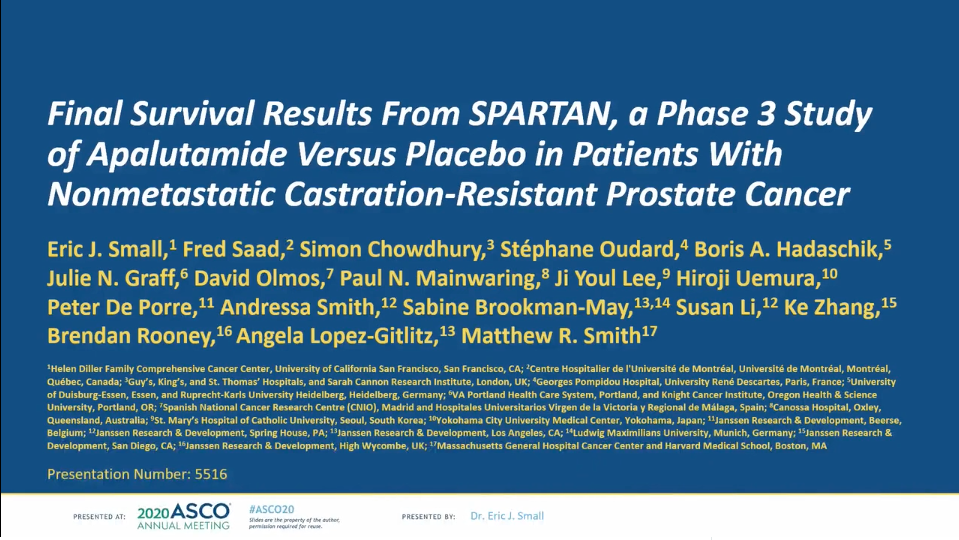At 3-years median follow-up, the randomised, phase 3 EORTC 1325/KEYNOTE-054 trial demonstrated that adjuvant pembrolizumab taken for up to 1 year in high-risk stage III melanoma patients improved recurrence-free survival (RFS), with a consistent effect across subgroups.
Prof. Alexander Eggermont (Princess Máxima Centre for Paediatric Oncology, the Netherlands) presented the study [1], whose purpose was to assess whether post-surgery therapy with pembrolizumab improves disease recurrence for high-risk participants with melanoma (stage IIIA [> 1 mm metastasis], IIIB, and IIIC), as compared with placebo.
The EORTC 1325/KEYNOTE-054 trial included 1,019 adults with stage IIIA (15%), stage IIIB (46%), or stage IIIC (39%) resected melanoma metastatic to lymph nodes. Patients were assigned to either adjuvant pembrolizumab (200 mg every 3 weeks) for up to 1 year (n=514) or placebo (n=505) for a total of 18 doses, until disease recurrence or unacceptable toxicity. The co-primary endpoints were RFS in the intent-to-treat population as a whole, and in patients with PD-L1-positive tumours as a pre-specified subgroup analysis.
Previously, with median follow-up of 1.25 years, the investigators reported improved RFS for pembrolizumab compared with placebo (HR 0.57). In the current presentation, results with a median follow-up of 3.05 years again showed superior RFS for the pembrolizumab group compared with the placebo group (190 vs 283 RFS events; HR 0.56; 95% CI 0.47-0.68). Among patients with PD-L1-positive tumours (n=853), 3-year RFS rates with pembrolizumab were also better than with placebo (65% vs 46%; HR 0.57; 95% CI 0.43-0.74; P<0.001). Pembrolizumab was also better than placebo for the RFS of patients with BRAF-mutated tumours (n=440; 62% vs 37%; HR 0.51; 95% CI 0.36-0.73) and patients with BRAF wildtype tumours (n=448; 62% vs 47%; HR 0.66; 95% CI 0.46-0.95).
In conclusion, adjuvant pembrolizumab conferred a durable, clinically meaningful RFS benefit for patients with resected high-risk stage III melanoma. “We have shown that longer follow-up confirms a very sustained RFS benefit for pembrolizumab compared with placebo,” Prof. Eggermont said. “We will report on distant metastasis-free survival when results are ready in the next 6 or 7 months.”
- Eggermont AM, et al. ASCO Virtual Meeting, 29-31 May 2020, Abstract 10000.
Posted on
Previous Article
« ctDNA levels promising for tracking melanoma treatment progress, predicting outcomes Next Article
Ivabradine helpful in postural orthostatic tachycardia syndrome »
« ctDNA levels promising for tracking melanoma treatment progress, predicting outcomes Next Article
Ivabradine helpful in postural orthostatic tachycardia syndrome »
Table of Contents: ASCO 2020
Featured articles
COVID-19 & Telemedicine
COVID-19 and Cancer Consortium Registry: initial results
Oncology hospital-at-home model reduces hospitalizations, emergency department visits, and costs
Nurse-led telephone triage system reduces hospitalizations, helps patients manage symptoms at home
Melanoma
Adjuvant pembrolizumab: durable RFS for stage III melanoma
Adjuvant pembrolizumab: durable RFS for stage III melanoma
Pembrolizumab plus low-dose ipilimumab well tolerated after progression on PD1 antibody therapy
Toripalimab plus axitinib effective in metastatic mucosal melanoma
Breast & Ovarian Cancer
Advanced breast cancer: locoregional therapy does not improve OS
T-DM1 does not improve safety or efficacy in HER-2 positive early breast cancer; favorable iDFS reported
Maintenance olaparib improves OS in relapsed ovarian cancer with BRCA1/2 mutation
Combination pembrolizumab/chemo improves PFS in metastatic TNBC
Effect of veliparib with or without cisplatin in breast cancer: results of SWOG S1416
PHOEBE, a phase 3 trial comparing pyrotinib and lapatinib in HER2-positive metastatic breast cancer
BYLieve demonstrates efficacy of PIK3CA-directed treatment post CDK4/6-ihibition
Strategies emerge for chemotherapy de-escalation in HER2-positive breast cancer
Multiple Myeloma
Carfilzomib: no PFS benefit for multiple myeloma
Lung Cancer
ES-SCLC: tremelimumab + durvalumab + chemotherapy misses endpoint
Adjuvant osimertinib in NSCLC: practice changing ADAURA trial
ES-SCLC: pembrolizumab KEYNOTE-604 data
Second-line gemcitabine plus ramucirumab significantly improves overall survival
Tiragolumab and atezolizumab: ORR in NSCLC
MET-amplified advanced NSCLC responds well to MET inhibitor capmatinib
Genitourinary Cancer
Urothelial cancer: avelumab works as maintenance therapy
ARAMIS final OS and nmCRPC safety outcomes
Final survival results from phase 3 SPARTAN trial
Novel drug for kidney cancers/VHL patients
Primary analysis from IMvigor010, adjuvant atezolizumab in high risk muscle-invasive urothelial carcinoma
First randomised trial of Lu-PSMA in mCRPC progressing after docetaxel
Gastrointestinal Cancer
HER2-expressing metastatic colorectal cancer: trastuzumab deruxtecan
REGOMUNE: a phase 2 study combining regorafenib and avelumab
Cardiotoxicity: consider switching to S-1
Perioperative chemotherapy for resectable pancreatic ductal adenocarcinoma
Real-world data of sequential sorafenib followed by regorafenib in unresectable HCC
Paediatric Cancer
Sustained improvements in quality of life with larotrectinib
Promising first immunotherapy trial in placental trophoblastic tumours
Precision medicine for poor-prognosis paediatric patients
Related Articles

September 17, 2020
Pembrolizumab as first-line in MSI-H mCRC

September 17, 2020
Final survival results from phase 3 SPARTAN trial
© 2024 Medicom Medical Publishers. All rights reserved. Terms and Conditions | Privacy Policy
HEAD OFFICE
Laarderhoogtweg 25
1101 EB Amsterdam
The Netherlands
T: +31 85 4012 560
E: publishers@medicom-publishers.com

